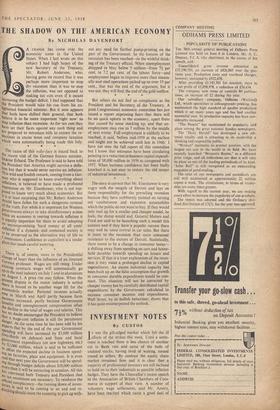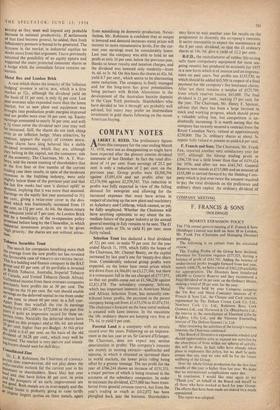INVESTMENT NOTES
By CUSTOS
1T was the gilt-edged market which felt the ill effects of the strikes this week. Until a settle- ment is reached there is less chance of another cut in Bank rate and some of the bulls of undated stocks, having tired of waiting, turned round as sellers. By contrast the equity share market remained firm and it is clear that a majority of professional investors are still inclined to hold on to their industrials as possible inflation hedges. They have the Chancellor's recent speech to the Association of British Chambers of Com- merce in support of their view. A number of voluntary wage settlements, said Mr. Amory, have been reached which cause a good deal of
THE SPECTATOR, JUNE 13, 1958 anxiety as they went well beyond any probable increase in national productivity. If settlements of that kind become general, he added, then fresh inflationary pressure is bound to be generated. The firmness in the market in industrial equities no doubt stems from that argument. I have previously admitted the possibility of an equity upturn and suggested the more protected consumer shares as a hedge while the immediate future remains un- certain.
Metal Box and London Brick A case which shows the tenacity of the 'inflation hedging' investor is METAL BOX, which is a firm market at 52s., although the dividend yield on the basis of 11 per cent. is only 4f per cent. Last Year overseas sales expanded more than the home market, but as new plant and equipment was brought into production profit margins improved and net profits were over 10 per cent. up. Equity earnings amounted to nearly 36 per cent. and with a times cover the dividend next year may well be increased. Still, the shares do not look cheap even as an inflation hedge. More attractive, by Contrast, appears the equity of LONDON BRICK. These shares have long behaved like a stable dividend investment, which they are, although they belong to the capital, not the consumer, side of the economy. The Chairman, Mr. A. T. Wor- b, nys, told the recent meeting of shareholders that in the first four or five months of the current trading year their results, in spite of the moderate recession in the building industry, were only Slightly below those of the previous year and that the last few weeks had seen 'a distinct uplift' in demand, implying that it was more than seasonal. Earnings on the equity last year amounted to 31f Per cent., giving a twice-over cover to the divi- dend which was fractionally increased from 15 Per cent, to 1511 per cent. At 44s. the shares return the adequate yield of 7 per cent. As London Brick will be a beneficiary of the re-expansion policy Promised before long by the Chancellor, in which Industrial investment, projects are to be given nigh priority,' the shares are not without attrac- tion.
Tobacco Securities Trust The search for companies benefiting more that' .'ne average from the new profits tax has revealed (ihe favourable case of TOBACCO SECURITIES TRUST. This is a holding and finance company in the BAT group and 83 per cent. of its portfolio is invested In British Tobacco, Australia, Imperial Tobacco ,f Canada, and United Tobacco (South Africa). unfranked income from these overseas companies Previously bore profits tax at 30 per cent. The savings on the 10 per cent. flat rate should enable ,4rnings on the deferred capital to rise from under Per cent. to about 60 per cent. in a full year. Apart from this windfall the rise in earnings equity from £412,000 to £572,000 in the past five Years is quite an impressive record for these un- certain times. Naturally the deferred shares have J..,13111Ped on this prospect and at 80s. 6d. are about 0 Per cent. higher than pre-Budget. At this price the Yield is 8.45 per cent. on the basis of the old dividend of 34.28 per cent., which may well be Increased. The market is very n narrow and intend- In buyers should wait for dull days. Consolidated Zinc Mr. L. B. Robinson, the Chairman of CONSOLI- ,. 1ED ZINC CORPORATION, did not play down the su.natavourable outlook for the current year in his let!e.ment to shareholders. Since May last year An and zinc have fallen 40 per cent. in price ;Inod the prospects of an early .improvement are ',good. ..., Both metals are in over-supply and the nited States is probably going to raise tariffs or impose import quotas on these metals, apart
from subsidising its domestic production. Never- theless, Mr. Robinson is confident that as output is lowered and demand increases metal prices will recover to more remunerative levels. For the cur- rent year earnings must be considerably lower. Last year the company was able to hold its net profit at only 10 per cent. below the previous year, thanks to lower royalty and taxation charges, and the dividend was lowered only modestly—from 4s. 6d. to 3s. 9d. On this basis the shares at 42s. 9d. yield 8.7 per cent., which seems to be discounting some reduction. The company is finely managed and for the long-term has great potentialities, being partners with British Aluminium in the development of the Australian bauxite deposits in the Cape York peninsula. Shareholders who have decided to 'see it through' are probably well advised, but many may prefer an intermediate investment in gold shares following on the recent American buying.



































 Previous page
Previous page